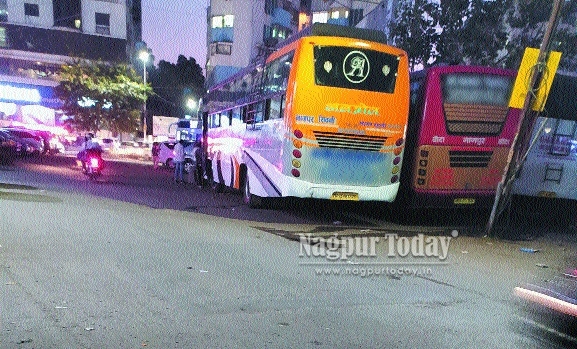
Nagpur: The already stretched road infrastructure in Nagpur is under siege — not from cars, but from a relentless swarm of over 800 private buses operating daily within city limits. A comprehensive study conducted by the Nagpur Traffic Police has sounded the alarm: The city is nearing gridlock, and private inter-state buses are a major culprit.
These buses — ferrying passengers to and from Madhya Pradesh, Chhattisgarh, Uttar Pradesh, Gujarat, Telangana, and cities like Pune, Yavatmal, Chandrapur, and Gadchiroli — are frequently seen clogging major junctions. Without any fixed terminals, they use busy intersections and roadsides as makeshift stops, halting to pick up or drop passengers at will.
Choked squares and chaos on the streets
From Baidyanath Chowk and Cotton Market Square to Residency Road and Central Avenue, the damage is visible daily — especially during morning and evening rush hours.
According to the traffic police study overseen by DCP Archit Chandak and ACP Madhuri Baviskar, congestion hotspots include Geetanjali Square, Indora, Automotive, Bole Petrol Pump, Campus, Telephone Exchange, Sneha Nagar, Liberty Chowk, Manas Chowk, and Jagnade Chowk.
“These buses obstruct smooth traffic flow and increase the risk of accidents. They often halt in the middle of roads for long periods,” said a senior traffic officer.
Police push for action — entry ban on the cards
With the problem spiralling out of control, the city’s traffic wing has submitted a detailed report to Commissioner of Police Ravinder Singal. One of the major recommendations: ban the entry of private buses into the city altogether.
“The proposal aims to decongest Nagpur’s roads and move these buses to terminals located on the outskirts,” a senior officer said. “We’re looking at all options — enforcement will be firm if approved.”
If implemented, the move would mark a significant shift in city transport policy. But it’s not without challenges.
Citizens caught in the middle
While commuters are frustrated with the daily snarls, an outright ban could also spell inconvenience. Passengers would have to disembark at depots outside municipal limits and arrange their own transport to reach city destinations like markets, offices, or hospitals.
“This will especially impact senior citizens, women with children, and patients coming for medical treatment,” noted a civic transport official. “It could also increase travel costs for many who rely on low-cost bus journeys.”
History repeats?
Notably, this isn’t the first time such a proposal has surfaced. In previous years, similar restrictions were mooted — but never implemented. This time, however, police say the situation is critical enough to demand action.
With over 10% of road space in some areas being eaten up by idling buses, enforcement could be the only way forward. Unless the city acts swiftly, commuters fear Nagpur’s roads may soon grind to a halt under the weight of an unregulated fleet.














